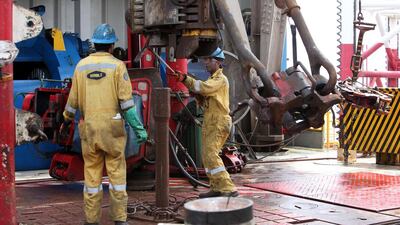sharjah // Arab states have been urged to re-evaluate their relationship with oil, phase out energy subsidies and invest heavily in renewable energy.
Revenue from oil and gas will continue to be crucial but governments should use the funds to develop renewable resources and focus on energy efficiency.
Energy subsidies should be phased out, private investment encouraged and national energy strategies established, the Arab Forum for Environment and Development says in a new report.
“Oil and gas are important, they will continue to be important,” said Najib Saab, the forum’s secretary general. “We call for more careful use of oil and gas and for more serious development of renewable energy.”
The forum published its report on Monday into the state of sustainable energy in 22 countries in the region.
Throughout the Arab world, hydrocarbons account for an average 36 per cent of GDP, but the figure varies widely from country to country – from 33 per cent in the UAE to 88 per cent in Saudi Arabia and Qatar, up to more than 97 per cent in Algeria and Iraq.
“Oil revenues have not been able to spur the kind of economic diversification many Arab producers aspired to and continue to aspire to, leaving most of them exceptionally reliant on what have proven to be highly volatile oil revenues,” the report says.
Hydrocarbons are important not only as a source of revenue for Arab countries but also for energy production locally. Oil and gas provide 97 per cent of domestic demand in the region, with renewables providing the rest.
However, oil and gas resources are being used inefficiently, with Arab economies among the least efficient in the world, the report warns.
In the past decade, the demand for energy and electricity has risen at an average of 8 per cent a year – outstripping economic growth at 4 per cent – and energy subsidies are a major part of the problem.
“Arab residential markets, for example, are the most heavily subsidised, with some countries offering an implied subsidy of up to 95 per cent for residential energy consumption,” says the report.
And while carbon emissions per capita in the 22 countries are among the highest in the world, 35 million people lack access to modern energy services.
Dr Saab said countries should focus on energy efficiency.
“The first source of renewable energy in the Arab countries is energy efficiency because we found out that you can save 50 per cent of the energy you are using through efficiency measures and still have the same amount of production.”
He said that on a more positive note, many governments in the region were realising the potential of solar and wind power. In 2012, new investment in renewables reached Dh7 billion, a six-fold increase from 2004. The UAE has been a pioneer in pursuing renewables, said Mr Saab.
Glada Lahn, a research fellow at Chatham House in the UK, agreed that a focus on energy efficiency was crucial.
“I am very excited about the level of ambition for renewable energy and the targets that are appearing in the region, but with 5 to 10 per cent growth in power demand these countries will not meet their renewable energy targets without efficiency,” she said.
Dr Malek Kabariti, a former minister of energy in Jordan and chairman of the country’s National Electric Power Company, called the report “extremely courageous” for its recommendation to phase out energy subsidies.
“We have the worst situation in Jordan, and I think a similar situation in Egypt and probably the Gulf countries,” he said. “Subsidies only go to the rich. Poor people do not have 3,000 square metres to live in, they do not have three four-wheel drives or Mercedes or BMWs, these people hardly use energy.
“It is very important to give the money to the right people.”
vtodorova@thenational.ae

